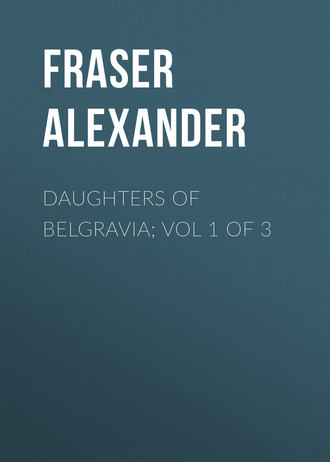 полная версия
полная версияDaughters of Belgravia; vol 1 of 3
“Tell me, Carl, what you are thinking of? Is it of that doll of a thing I saw you go and speak to the other night, between the acts? Is it the money I hear she has or her silly face that runs in your head? And yet – no, I don’t care to hear it is her face, for then I should be jealous – jealous as a tiger-cat, Carl! and jealousy is an ugly sensation to which I have not been subject, thanks to the goodness of an appreciative public!”
And as she speaks, she walks up to the sofa, and bends over him with a steady, keen look, adding in her tenderest, softest tone:
“Surely, Carl, you are not going to bowl me over for another woman?”
Carl gives a final puff to his nearly consumed cigar, and deliberately removing it from his mouth, throws it negligently into a superb Dresden casket that stands near him on a marble slab. Then he does not rise, but quietly turns over to his side and faces her.
Not a gleam of liking for her could be traced on his handsome aquiline features by the most adept of physiognomists. His eyes have a cold and callous light in them as they meet the fine melting brown orbs that search for a reciprocal look, and the tone of his voice is hard and utterly passionless as he answers her.
“Whatever heart I have is, of course, yours, Flora, but one cannot subsist on love, you see. No one knows this better than you do, judging by all this splendour. You have said you were in love with me – and I believe you are, but nevertheless, that love hasn’t been enough for you, and the Duke of Beaudesert, Lord Lennerdale, etc., etc., have all been tolerated when Cupid came, laden with marqueterie and Chelsea, and so on. The ‘doll of a thing,’ as you are pleased to call Miss Meredyth, is not such a magnificent piece of flesh and blood as yourself – but she is very respectable!”
The colour flames up into the leading lady’s cheek, her eyes shoot angrily, and for an instant she looks quite plain. His words sting like nettles.
“Very respectable! Did you say that to insult me, Carl? For you know I am not what prudes and fools call very respectable, and I don’t want to be! Don’t you dare to taunt me, Carl! You will try to marry that Miss Meredyth,” she goes on in a sharp voice, her rather ponderous foot beating a tattoo on the velvet pile; “but it will be only for her money. Oh, you cannot deceive me! I, who know each turn of your mind, who read you like an open book! And for an excuse for your paltry, interested motives, you lie there, and talk to me of her —respectability. Good heavens! I begin to feel contempt for you – a contempt all fellows deserve when they are ready to sell themselves to the highest bidder!”
A flush slowly mounts into the man’s pale cheeks, and he bites his lips hard as he listens to her insolent tone, but he is too lazy by nature to be roused quickly into recrimination, and he cares too little for her to take much heed of her words or contemptuous gestures.
“Flora, you are going too far,” he says very quietly, with a callousness that goes far to irritate her more. “You forget whom you are speaking to. Your noble admirers may bow down to your tempers, but I won’t. I am too proud to subject myself to them, and too indolent to retort, so, as you are not too amiable, I will wish you good-night, and when we meet again, I hope you will be more pleasant to look at, and to speak to.”
“You shan’t go, Carl! you and I have been together for three years, and I won’t have you marry that girl. I’ll forbid the banns, and make such a scandal in the church that all London will ring with it.”
Carlton Conway looks up at her, and taps his well varnished boot with his silver-headed cane.
“Pshaw, and why?” he asks with an accent of surprise.
Miss Fitzallan regards him fixedly and passionately, then throws herself down tragically on her knees by his side.
“Because I love you, Carl.”
“What did you say? But enough of this, let us finish this folly at once, Flora! You appear strangely to misunderstand the nature of our relations to one another. If so, you had better rectify your ideas on the subject as soon as possible. The relations that may have existed between us yesterday are not forced to exist to-day. It is the old story, my dear Flora, acted in every part of the world, in every phase of society from the Royalties down to the costermongers, and yet you, sharp as you are, don’t seem to comprehend it. It is that in this world there are two sorts of women – one sort, charming like you, lawless like you, to whom a man gives either an hour or a year of his life, according to his own free will – a sort that please him one day, and disgust him the next, who ought not to expect from him anything, but attention sometimes, caprice and changeability always. A sort he takes up without any reality of feeling, and puts down without compunction or remorse. The other sort is like Miss Meredyth, brought up properly, with decent notions and respectable ways. To them a fellow naturally gives his life, his love, his respect, his name, and for these he abandons such as – Flora Fitzallan. You were born to be a plaything for a time; Miss Meredyth was born to be a guardian angel. You have insulted me, my dear Flora, you have credited me with vile interested motives, and forced me to place the above truisms before you, and now, perhaps, you will let me go.”
He rises slowly, takes his hat, and drawing on his gloves lounges to the door.
Miss Fitzallan looks round, and tries to find in his face some signs of indecision, but fails, and she notices that there is no perceptible lingering in his step.
Frantic jealousy and anger, mingled with love for him, possess her. He is really the only man she has loved, and whose companionship has given her any genuine happiness in her tinsel existence of stage spangles and hypocrisy; without him she thoroughly believes she cannot live.
“Carl, come back, don’t leave me like this,” she cries pitifully. “If my love for you has made me say one word to vex you, see, I ask your pardon on my knees, for Carl, you know how I love you, worship you, that there is nothing in the whole world that I would not sacrifice for you and your good except the sight of you, Carl, and that I must have or die! Come back, and give me a kiss of forgiveness, and if you say anything horrid I will be mum.”
Miss Fitzallan has assumed a pose that would bring down the house if she were on the stage at this moment. It is so fine, so artistic, and she has called up all the emotional fire she knows into her big brown eyes, exerting herself as much to chain and enchant this man as though she was the cynosure of all London. It seems to her at this moment that there is but only one thing worth striving for, or existing for, and that is Carlton Conway’s devotion.
Her nature is perverse like other women’s, coveting what seems difficult to gain, undervaluing what is willingly offered.
“My dear Flora, now you are yourself again,” he says carelessly, just sweeping his moustache across her brow, and then sinking into the arms of a capacious fauteuil, “and I don’t mind confiding to you the lamentable fact that I am deuced hard up. What with garments for the stage, and off the stage, button-holes for the Park and the balls (Hooper in Oxford Street had the impudence to charge me three-and-sixpence for a gardenia the other day), I am just at the end of my tether. I want a new hat, new gloves, a new kit altogether, and devil a bit do I know who to squeeze the tin out of. I must sacrifice myself to a fortune, you see.”
“Oh, Carl, but it’s hateful the thought of your marrying anyone else. If it wasn’t for some silly prejudice you might marry me; I have got heaps of money you know.”
Yes, he does know, and that how the money was got is a fact that it is better not to enquire into. Marry her? marry the leading lady of the Bagatelle Theatre? when he is a regular swell himself, in spite of his being an actor! The shade of his uncle, the Marquis of Eversleigh, forbid it!
He stares at her incredulously, and seeing she is in earnest bursts into a loud laugh.
The next moment he asks her pardon for his rudeness, for Carl is a gentleman born.
“You are cruel to me, very cruel,” she sobs, always with a due regard to the artistic, “but you will promise me one thing, won’t you, Carl? It is that, once married, and the fortune secured, I shall see you again as often as I do now.”
“All right, Flora, but that will be on one condition. It is that you won’t bother me with letters or anything. Letters are so deuced dangerous, you know, especially if one’s wife gets hold of them, and grows close-fisted with the pocket-money. If I marry Crystal Meredyth,” he adds to himself, “she’ll have to fork out pretty considerably to make up for the amount of insipid talk that falls from her lips. Now if it was Zai! Ah! I’d take her with nothing, and work like a slave to keep my dainty little girl clothed like a princess, but she has thrown me over for that lardy-dardy swell, and joy go with her.”
“Good-night, Flora,” he says, rising lazily, “and mind and keep my counsel. If father and mother Meredyth, who are the properest couple alive, were to hear one whisper about you, they would send me flying.”
“I’ll keep your counsel, Carl; I wouldn’t injure a hair of your head, not to save my life.”
“Well, perhaps you wouldn’t, little woman, or perhaps you would, cela selon. I never had much faith in mankind, or womankind either to say the truth, and I am too old in worldly wisdom to begin now – ta-ta.”
END OF VOLUME I


